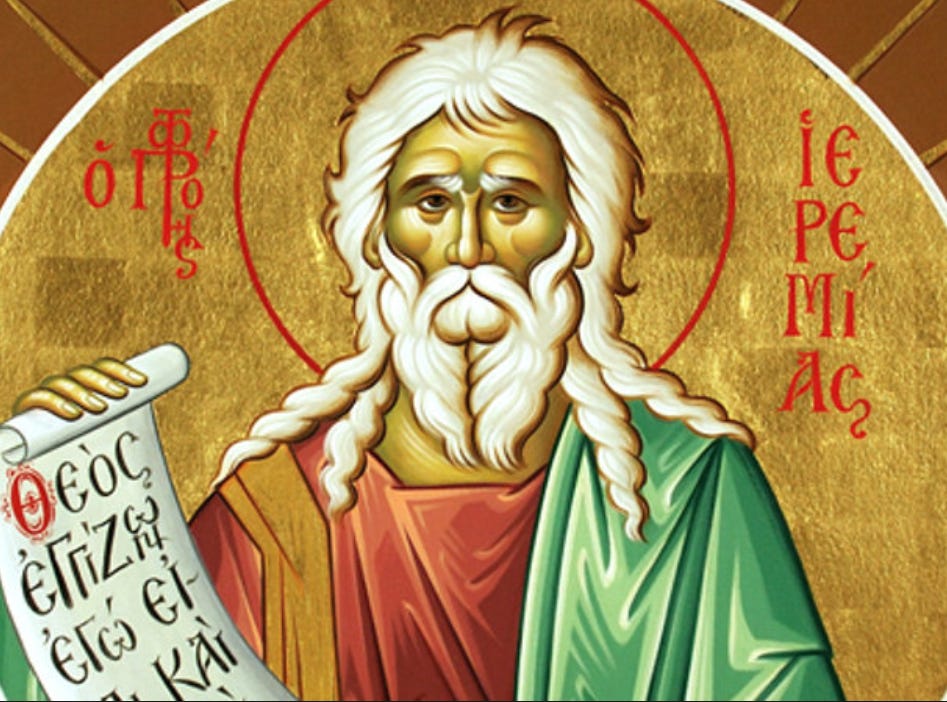The Prophet of Suffering: Saint Jeremiah
Surrounded by false prophets, mourning for God's people, and suffering on account of the Truth
cCleansing your radiant heart through the Spirit, / O great Prophet and Martyr, / glorious Jeremiah, / you received from on high the gift of prophecy. / You cried out with a great voice to the nations: / This is our God, and there is none other beside Him / Who became incarnate and appeared on earth. –Kontakion
The Prophet Jeremiah is commemorated on May 1 in the Orthodox Church
The prophet Jeremiah is often referred to as the Prophet of Suffering or the Weeping Prophet because of the tragic nature of his prophetic ministry. Called by the Lord in thirteenth year of the reign of Josiah (Jeremiah 1:2), Jeremiah proclaimed the Word of the Lord for over forty years. But the people would not listen (see Jeremiah 7:27; 13:10; 17:23; 18:12; 19:15). Not only did Jeremiah suffer bouts of weeping on account of Israel’s obstinacy (Jeremiah 4:19), but he also suffered physical harm; he was beaten, put in stocks, and imprisoned (Jeremiah 20:1–2; 37:15), threatened with death (Jeremiah 26:11), and even thrown into a dungeon where he “sank in mire” (Jeremiah 38:6).1 And after enduring all of this, he was called a liar (Jeremiah 43:2).
Throughout his ministry he was surrounded by false prophets (see Jeremiah 14:14; 23:21) who taught not from the power of the Lord but from the fantasy of their own minds. Indeed, Jeremiah’s prophetic ministry, in which he seems to constantly proclaim the judgement of the Lord on a stiff-necked people, is colored with laments from his own, broken heart.2 In one such lament, he proclaims:
I would comfort myself in sorrow; my heart is faint in me…Oh, that my head were waters, and my eyes a fountain of tears, that I might weep day and night For the slain of the daughter of my people! (Jeremiah 8:18, 9:1)
And he continues mourning for his kinsman in the appropriately named books of Lamentations:3 “my eyes flow and do not cease, without interruption, till the Lord from heaven looks down and sees. My eyes bring suffering to my soul because of the daughters of my city” (Lamentations 3:49–50). He likewise laments his own plight as a prophet of the Lord:
[The Lord] has led me and made me walk in darkness and not in light. Surely He has turned His hand against me time and time again throughout the day. He has…broken my bones. He has besieged me and surrounded me with bitterness and woe. He has set me in dark places like the dead of long ago…He has made my chain heavy. Even when I cry and shout, He shuts out my prayer…He has turned aside my ways and torn me in pieces…I have become the ridicule of all my people. (Lamentations 3:2–3, 4–6, 7–8, 11, 14).
He even goes so far as to say that “the Word of the Lord was made to me a reproach and a derision daily” (Jeremiah 20:8). Truly, if there ever was a “man of constant sorrow”4 it was Jeremiah. But in the face all his trials, Jeremiah does not lose hope, “for the Lord will not cast off forever. Though He causes grief, yet He will show compassion according to the multitude of His mercies” (Lamentations 3:31–32). And in the life of the Prophet Jeremiah, and his constant sorrow, we see an image of the Man of Sorrows, Jesus Christ (see Isaiah 53:1–12), who, like Jeremiah, wept for His kinsman (see John 11:35), was rejected (see John 6; Luke 4:14–30, etc.), and suffered on account of His people.5
Saint and Prophet Jeremiah, pray for us.
Watch the video about the Prophet Jeremiah here.
On Jeremiah’s suffering at the hands of his enemies, consider also Lamentations 3:52–54: “My enemies without cause hunted me down like a bird. They silenced my life in the pit and threw stones at me. The waters flowed over my head; I said, ‘I am cut off!’” He goes on in verses 55–66 of the same chapter to lament in a fashion similar to Job.
It was during Jeremiah’s ministry that the Southern Kingdom fell (which inaugurated the Babylonian Captivity) in 587 (see Jeremiah 25).
While some may be reticent ascribe authorship of Lamentations to Jeremiah (because there is no mention of Jeremiah – or the author’s name – in the book itself), its contents (as well as the mention of Jeremiah’s lament on account of King Josiah’s death in 2 Chronicles 35:25) seem to adequately substantiate his authorship.
See the song “Man of Constant Sorrow” by the Soggy Bottom Boys (O Brother, Where Art Thou. Touchstone Pictures: 2000).
On Jeremiah as a type of Christ, consider also Jeremiah 11:19: “But I was like a docile lamb brought to the slaughter.”




